Small irony: a theater ticket taker initially denies access to CITZENFOUR, the remarkable new documentary on Edward Snowden
By Peter Lance December 1st, 2014. Saturday night at The Plaza de Oro, the Metropolitan Theatre chain’s Santa Barbara “art house,” I was initially denied entry to a screening of CitizenFour, Laura Poitras’ deeply troubling documentary on Edward Snowden, the ex-CIA and DIA analyst who blew the cover off the NSA’s illegal surveillance of millions of Americans in the name of “national security.”
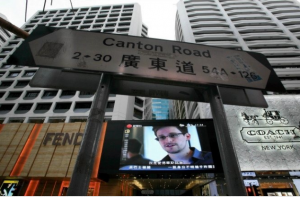 As a member of The Writers Guild of America West I tried to screen the film pursuant to an agreement Metropolitan and most L.A. area theater chains have with the various Guilds during “awards season” allowing members to access important films in the course of the nomination process. Over the past two weeks I’ve screened a half dozen films this way at other Metropolitan venues by presenting my WGA card and signing a form.
As a member of The Writers Guild of America West I tried to screen the film pursuant to an agreement Metropolitan and most L.A. area theater chains have with the various Guilds during “awards season” allowing members to access important films in the course of the nomination process. Over the past two weeks I’ve screened a half dozen films this way at other Metropolitan venues by presenting my WGA card and signing a form.
But this time the ticket taker smugly told me that CitizenFour “was not on the list” of films for awards consideration. When I protested politely that I’d gone through this protocol at other Metropolitan theaters, she added her own personal review. “It’s not likely that this film will even be nominated.”
I beg to differ. CitizenFour proves that multiple Obama administration officials lied to congress about the depth and breadth of the NSA’s epic collection of meta-data which allowed that agency to personally monitor every American with a cell phone who goes on line, not to mention 100’s of millions of people worldwide. So after paying for my ticket and watching Ms. Poitras’ devastating account of Snowden’s data dump to her and Guardian US reporter Glenn Greenwald, I felt compelled to talk to the theater’s manager after the final credits had rolled. 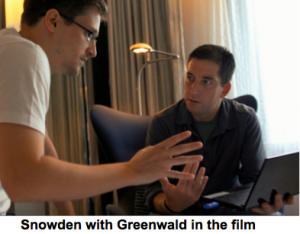
Clearly if any documentary deserves to be seen (and nominated) this season it is this film which portrays Snowden as an articulate, and thoughtful advocate for government accountability vs. the callous traitor and spy he’s been cast as by the Obama administration which was quick to indict him under The 1917 Espionage Act.
BIG BROTHER TO THE POWER OF TEN
To get some sense of how this doc unfolds as a real-life John Le Carré thriller, consider this warning from Snowden to Ms. Poitras in one of the emails that led to his disclosures: “I am a senior government employee in the intelligence community. I hope you understand that contacting you is extremely high risk. For now, know that every border you cross, every purchase you make, every call you dial, every cell phone tower you pass, friend you keep, site you visit and subject line you type is in the hands of a system whose reach is unlimited but whose safeguards are not. In the end if you publish the source material I will likely be immediately implicated. I ask only that you insure that this information makes it home to the American public.”
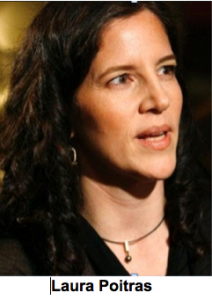 That revelation of the NSA’s end-run around The Fourth Amendment and the system of FISA Courts in which the agency collects every bit of electronic data communicated by American citizens, then analyzes it in a way that allows them to track us and predict our behavior, should have qualified Snowden for The Nobel Peace Prize vs. the exile in Russia he was forced into when the U.S. revoked his passport in June of 2013.
That revelation of the NSA’s end-run around The Fourth Amendment and the system of FISA Courts in which the agency collects every bit of electronic data communicated by American citizens, then analyzes it in a way that allows them to track us and predict our behavior, should have qualified Snowden for The Nobel Peace Prize vs. the exile in Russia he was forced into when the U.S. revoked his passport in June of 2013.
There’s an irony in the act of a ticket-taker attempting to limit access to a film which celebrates full disclosure. But after seeing CitizenFour I was propelled to write this piece for reasons grounded in my own experience as an investigative reporter. First, I’ve relied for decades on courageous whistleblowers who have risked their careers and their freedom to expose waste, malfeasance and corruption in government.
Second, given what I know about how the federal government, at the highest levels, breaks the law with impunity to silence its critics, Snowden’s heroic actions should have prompted me to speak out in his defense sooner. Now this extraordinary film has caused me to say what I should have 18 months ago when the 29-year old analyst went public.
As a political Liberal who believed in Barack Obama’s promises of transparency I was shocked that a former constitutional law professor like the President could treat Snowden in such a Draconian manner, particularly after his own NSA Review concluded that “the use of (Patriot Act) section 215 meta-data was not essential to preventing attacks and could readily have been obtained in a timely matter” via other less intrusive methods.
And while we’re talking about irony, my own decade-long reporting on the intelligence failures of the FBI in four investigative books for HarperCollins has documented multiple “acts of terror,” missed by the Bureau since they first began monitoring an al Qaeda cell in Brooklyn in the summer of 1989.
For the full story see this link to the 32 page timeline in my third book “Triple Cross: How bin Laden’s Master Spy Penetrated the CIA, the Green Berets and The FBI.”
HOW DID THEY MISS THESE TERRORISTS?
One has to ask: with America’s $80 billion-a-year intelligence gathering apparatus and the massive interdiction of civil liberties documented in CitizenFour, permitting the government to penetrate our most intimate relationships, how did they miss two of the most notorious homegrown terror threats since 9/11: Faisal Shazhad the “Times Square Bomber,” who parked a WMD in the New York theater district in May, 2010, only to have the plot thwarted by an alert bystander and the Tsarnaev brothers who succeeded in executing the deadly Boston Marathon bombing after the Bureau was warned about them two years earlier?
This is what I reported in my latest book, “Deal With The Devil.” 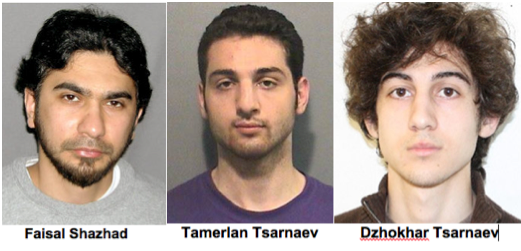
Right after Shazhad’s device failed to detonate, the NYPD did a remarkable job of bringing him to ground within 53 hours. But there was a shocking revelation in a New York Times story on Shazhad that was overlooked by the rest of the mainstream media.
George LaMonica, a 35-year-old computer consultant who purchased his condo in Norwalk Connecticut from Shazhad in 2004 told Times reporters that ‘A few weeks after he moved in investigators from the Joint Terrorism Task Force interviewed him, asking for details of the transaction and for information about Mr. Shahzad.’
It turned out that Shazhad had received five months of training at a terrorist camp in Waziristan, Pakistan and he’d returned just three months before parking his Nissan Pathfinder full of explosives adjacent to the Marriott Hotel in Times Square. 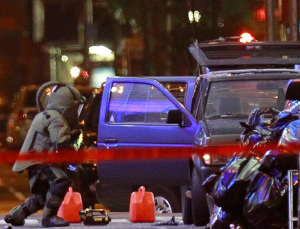
The fact that he was able to build such a weapon of mass destruction on his own and that he moved it into a location where an explosion would have produced mass casualties, gives one pause, particularly when we now know that six years earlier, agents from the JTTF had Shazhad on its radar and inexplicably no one within the Bureau connected the dots on the threat.
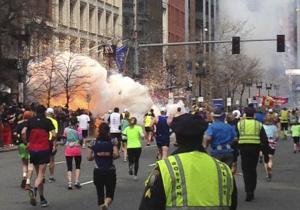 And while local police in Boston interdicted the Tsarnaev brothers within four days of the deadly Boston Marathon bombings in 2013, it soon became known that 26-year-old Tamerlan Tsarnaev had been vetted and cleared by the FBI in 2011 after the Russian government had asked the Bureau to investigate his links to terrorism. That prompted calls by the Chairman of the House Homeland Security Committee Rep. Peter King to ask, ‘Did They move too quickly by letting this guy off the hook?
And while local police in Boston interdicted the Tsarnaev brothers within four days of the deadly Boston Marathon bombings in 2013, it soon became known that 26-year-old Tamerlan Tsarnaev had been vetted and cleared by the FBI in 2011 after the Russian government had asked the Bureau to investigate his links to terrorism. That prompted calls by the Chairman of the House Homeland Security Committee Rep. Peter King to ask, ‘Did They move too quickly by letting this guy off the hook?
The answer of course, is that they did. But the Bureau escaped any serious scrutiny for that colossal act of negligence which led to the blowback in Boston.
CRITICS OF THE FILM
Most of the criticism of CitizenFour, in a Slate.com column by Fred Kaplan and a Daily Beast post by Michael Cohen, focuses on the other irony in this story: that to connect with Poitras and Greenwald, Snowden chose Hong Kong — which lately, pro-democracy demonstrators have reminded us is the slightly-more-open “Administrative Region” of the hugely repressive People’s Republic of China — and that Snowden is now living with his girlfriend in a dacha provided by Vladimir Putin, the ex-KGB hood who has sneered at international law in his invasion of Ukraine. But the fact that the U.S. cast Snowden as a traitor/spy as soon as he was outed, demonstrates that he had few options when it came to a point of rendezvous with the filmmaker and the reporter whom he rightly hoped would tell his side of the story.
Perhaps the most chilling scene in CitizenFour comes when an ACLU lawyer, one of several international attorneys seeking to help Snowden, describes the nature of The Espionage Act, a World War One-era statute for which there is virtually no defense.
Daniel Ellsberg whose leaks exposed the calculated fraud behind America’s escalation in Vietnam was spared Snowden’s fate and exile because he dumped “The Pentagon Papers” on The New York Times, which, then had the courage to publish them. The fact that in 2013 Edward Snowden came to believe that his best refuge was with a documentary filmmaker and reporter based in Brazil who wrote for a U.K. owned newspaper speaks volumes about the options for today’s whistleblowers.
That said, CitizenFour ends with a particularly disturbing scene.
After Snowden describes Britain’s GCHQ, their equivalent to the NSA, as being even more invasive than the U.S. SIGINT spy agency, we see the two memory cards he gave to Greenwald containing his data dump being destroyed – literally drilled with holes after The Guardian, we’re told, knuckled under to GCHQ pressure. A laptop, which also contained the data, was later taken apart under orders from the British government. The 21st Century equivalent of a book burning.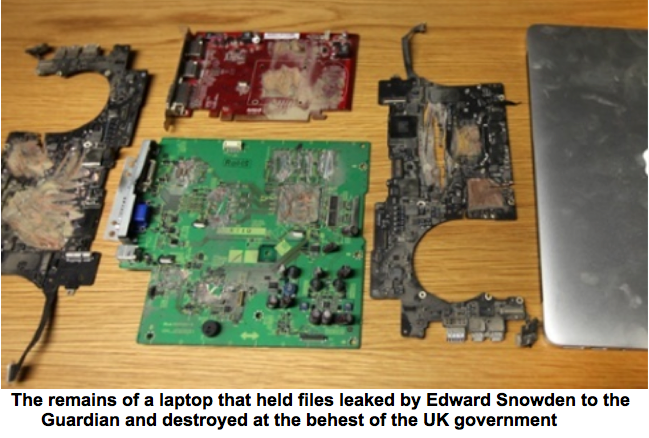
The series that Greenwald and Ewan MacAskill reported for The Guardian US won the 2014 Pulitzer Prize for Public Service and the award was shared with The Washington Post, where Laura Poitras and Barton Gellman published other Snowden disclosures. But it’s significant that neither The WashPost, The New York Times or any of the major U.S. dailies or broadcast networks were Edward Snowden’s initial media outlets of choice.
When it comes to the free-exchange of information in cyber-space, the worst part of all this is the chilling effect it could have on the next intelligence insider, who feels compelled to risk all in pursuit of the truth. The message from the Obama administration is clear: go public and we’ll lock you away for life. But that’s what makes this film so important: the notion that there is still a place where a whistleblower can get to, even if the back-end consequence may be years in exile.
It’s another small irony that the lead storyline in the final season of Aaron Sorkin’s Newsroom (now airing on HBO) focuses on the jeopardy that a major news organization can be in for even covering such a story. And it won’t be lost on viewers of this documentary that by merely going to a screening of CitizenFour or blogging about it as I’m doing right now, they could easily end up on the NSA’s “hot list.” But that’s all the more reason for people to invest as many megabytes as possible in a global discussion of the film’s revelations.
In a democracy the “offense” of full unbridled debate is the best “defense” against tyranny.
DEFYING THE TICKET-TAKER’S PREDICTION
Citizenfour is a ground-breaking film that every Guild member should screen and every American should watch. As I later learned, the ticket taker’s initial attempt to limit my access was the result of a dictum from a Metropolitan Theatres executive to “go easy” on the screen passes to Guild members. It certainly wasn’t the result of some nefarious NSA plot. But censorship often manifests itself in unusual ways.
Meanwhile, as to her prediction that CitizenFour probably wouldn’t be nominated, the woman at the ticket window appears to be wrong. The film has already shown up on two of the season’s “best film” lists, ranking No. 18 on Sight & Sound’s “Top 20” and No. 3 on Washington Post critic Ann Hornaday’s “Top Ten.”
As Hornady describes it, “Citizenfour, Laura Poitras’ taut, claustrophobically effective documentary, in which she puts viewers in the Hong Kong hotel room when former National Security Agency contractor Edward Snowden first shared his revelations about government surveillance, unspools like a real-time thriller that both humanized its subject, clarified his purpose and reminded viewers what’s at stake in his disclosures.”
Copyright 2014 by Peter Lance



Recent Comments